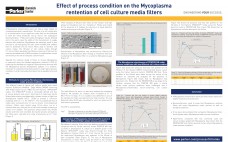We herein describe a 3M Purification Inc. depth filter media – Zeta PlusTM DELI that exhibits selective adsorptive properties for plasma lipids. Lipids plug chromatographic columns and filters during plasma fractionation steps and cause solution instability for the final product. Several parameters which could affect the lipid removal efficiency on Zeta Plus DELI have been investigated: prefiltration, contact time, ionic strength, pH, and temperature. The maximum percentage of total lipids eliminated, in optimal operating conditions, was 68%. This method has…
Friday, November 4, 2011 Daily Archives
Salt-tolerant cation exchanger for direct capture of proteins
Ion-exchange chromatography is widely used for the purification of biotherapeutic proteins. Usually, cation exchangers are applied in the primary capture step of proteins with alkaline pI. Conventional ion-exchange chromatography has the advantage of high-binding capacity, but it requires low salt conditions for protein binding and consequently adjustment of conductivity of clarified culture supernatant. An alternative method to maintain some binding capacity at higher conductivity levels is working at low pH condi¬tions notwithstanding that some proteins are sensitive to acid treatment.…
Evaluating AMMP Protein A Assays: Comparing Sample Preparation Methods, Ligand Performance & Assay Performance
Regulations governing the production of biopharmaceuticals require high levels of purity for processes utilizing Protein A affinity chromatography. It has been shown that Protein A in the presence of IgG forms a PA/IgG complex that interferes in the traditional immunoassay format for detecting Protein A. In this work we evaluated the AMMP Protein A Assay using two popular sample preparation methods to dissociate the ProteinA/IgG complex. The AMMP assay was also tested with Protein A ligands from multiple sources including…
A Single-Use Bioreactor for Both Cell and Microbial Cultures: A Dream Becomes Reality
Application of single-use equipment is common practice in the biopharmaceutical industrial and academic field. Compared to the traditional glass or stainless steel bioreactors, single-use bioreactors offer clear advantages: a quicker turnaround time; minimal utilities required; greatly reduced risk of cross contamination; more operational flexibility; reduced validation requirements. However, until recently, single-use bioreactors have a restricted application, only to animal cell cultures due to limitations in mixing and mass-transfer. As single-use technology not only has significant benefits for cell culture processes,…
Protein A Cellulose, a new mAb purification platform
Protein A chromatography is widely used as capture step in monoclonal antibody purification processes. Many types of chromatographic media are commercially available for this application however mainly Agarose and Porous glass based products are considered as standard mAb purification platforms due to high dBC and high operational flow rates. In fact process optimization of Protein A step is mainly aimed to have higher capacity and lower elution volumes in shorter process time. In this context Kaneka has been investigating highly…
Effect of process condition on the Mycoplasma rentention of cell culture media filtersMethods
A Mycoplasma contamination event can have a major impact on a biopharmaceutical manufacturer. The loss of a cell culture due to a contamination incurs significant costs that can be attributed to both the initial bioreactor set-up and to the subsequent decontamination. Production facility throughput may be affected and in the worst cases the ability of the manufacturer to supply patients with medicines. Mycoplasma are extremely small in size and lack a cell wall giving the cells some flexibility that enables…





